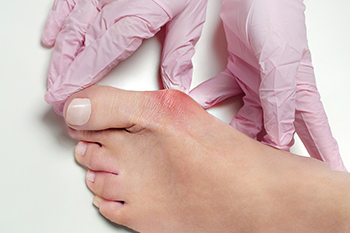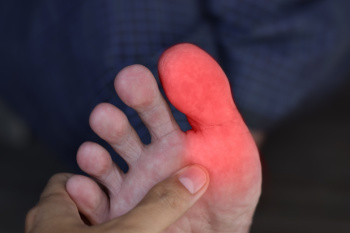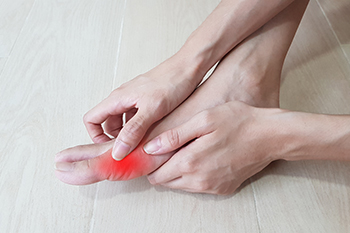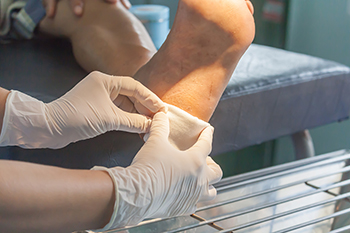Connect With Us
Blog
Items filtered by date: September 2024
Deciding on Bunion Surgery

A bunion is a bony bump that develops on the side of the foot, near the base of the big toe. Bunions often cause pain and present challenges when wearing shoes. Bunion surgery may become necessary if non-surgical treatments, such as wearing wider shoes, padding, or toe spacers are not effective in relieving pain. The goal of bunion surgery is to realign the bones, remove the bony lump, and restore the normal function of the toe. Without surgery, bunions tend to worsen over time and may lead to further complications, like joint pain or inflammation. A podiatrist can guide you through both surgical and non-surgical options to help manage the condition and improve your comfort. Deciding on surgery depends on factors like pain levels, activity limitations, and the progression of the bunion. If you are uncertain about bunion surgery, it is suggested that you make an appointment with a podiatrist for an exam, diagnosis, and treatment options.
If you are suffering from bunions, contact Charles Oehrlein, DPM of Hoover Foot Care. Our practitioner can provide the care you need to keep you pain-free and on your feet.
What Is a Bunion?
A bunion is formed of swollen tissue or an enlargement of boney growth, usually located at the base joint of the toe that connects to the foot. The swelling occurs due to the bones in the big toe shifting inward, which impacts the other toes of the foot. This causes the area around the base of the big toe to become inflamed and painful.
Why Do Bunions Form?
Genetics – Susceptibility to bunions are often hereditary
Stress on the feet – Poorly fitted and uncomfortable footwear that places stress on feet, such as heels, can worsen existing bunions
How Are Bunions Diagnosed?
Doctors often perform two tests – blood tests and x-rays – when trying to diagnose bunions, especially in the early stages of development. Blood tests help determine if the foot pain is being caused by something else, such as arthritis, while x-rays provide a clear picture of your bone structure to your doctor.
How Are Bunions Treated?
- Refrain from wearing heels or similar shoes that cause discomfort
- Select wider shoes that can provide more comfort and reduce pain
- Anti-inflammatory and pain management drugs
- Orthotics or foot inserts
- Surgery
If you have any questions, please feel free to contact our office located in Hoover, Oneonta, and Munford, AL . We offer the newest diagnostic and treatment technologies for all your foot care needs.
Causes and Symptoms of Toe Burning Sensation

A burning sensation in the toes can be both uncomfortable and alarming. This symptom often results from nerve damage or irritation from conditions like neuropathy or peripheral artery disease. Common causes include wearing ill-fitting shoes, prolonged standing, or medical issues like diabetes. In addition to burning, you might experience additional symptoms such as bleeding or blistering from friction or injury, numbness from nerve involvement, and swelling from inflammation. Properly addressing the root cause, whether it involves changing footwear, or managing underlying health ailments is essential for relief. If you have this condition, it is suggested that you consult a podiatrist who can effectively treat this condition.
Toe pain can disrupt your daily activities. If you have any concerns, contact Charles Oehrlein, DPM of Hoover Foot Care. Our practitioner can provide the care you need to keep you pain-free and on your feet.
What Causes Toe Pain?
Most severe toe pain is caused due to a sports injury, trauma from dropping something heavy on the toe, or bumping into something rigid. Other problems can develop over time for various reasons.
Toe pain can be caused by one or more ailments. The most common include:
- Trauma
- Sports injury
- Wearing shoes that are too tight
- Arthritis
- Gout
- Corns and calluses
- Hammertoe
- Bunions
- Blisters
- Ingrown toenails
- Sprains
- Fractures (broken bones)
- Dislocations
When to See a Podiatrist
- Severe pain
- Persistent pain that lasts more than a week
- Signs of infection
- Continued swelling
- Pain that prevents walking
Diagnosis
In many cases the cause of toe pain is obvious, but in others, a podiatrist may want to use more advanced methods to determine the problem. These can range from simple visual inspections and sensation tests to X-rays and MRI scans. Prior medical history, family medical history, and any recent physical traumatic events will all be taken into consideration for a proper diagnosis.
Treatment
Treatments for toe pain and injuries vary and may include shoe inserts, padding, taping, medicines, injections, and in some cases, surgery. If you believe that you have broken a toe, please see a podiatrist as soon as possible.
If you have any questions please feel free to contact our office located in Hoover, Oneonta, and Munford, AL . We offer the newest diagnostic tools and technology to treat your foot and ankle needs.
Managing Gout Pain

Gout is a form of arthritis that often targets the big toe, causing sudden, intense pain, swelling, and redness in the joint. This happens when uric acid crystals build up in the joints, leading to inflammation. During a gout attack, the affected joint, especially the big toe, can become extremely painful, making even light contact unbearable. Treatment focuses on relieving the pain and inflammation quickly, usually with medications like NSAIDs, colchicine, or steroids. These are most effective when taken as soon as the attack begins. To prevent future flare-ups, a podiatrist may prescribe medication that lowers uric acid levels in the blood, helping to dissolve the crystals and prevent new ones from forming. Restricting intake of certain foods that contribute to uric acid build up is also important. A podiatrist can diagnose gout and offer effective treatments to manage both the immediate pain and long-term prevention. If you are experiencing pain from gout, it is suggested that you schedule an appointment with a podiatrist.
Gout is a foot condition that requires certain treatment and care. If you are seeking treatment, contact Charles Oehrlein, DPM from Hoover Foot Care. Our practitioner will treat your foot and ankle needs.
What Is Gout?
Gout is a type of arthritis caused by a buildup of uric acid in the bloodstream. It often develops in the foot, especially the big toe area, although it can manifest in other parts of the body as well. Gout can make walking and standing very painful and is especially common in diabetics and the obese.
People typically get gout because of a poor diet. Genetic predisposition is also a factor. The children of parents who have had gout frequently have a chance of developing it themselves.
Gout can easily be identified by redness and inflammation of the big toe and the surrounding areas of the foot. Other symptoms include extreme fatigue, joint pain, and running high fevers. Sometimes corticosteroid drugs can be prescribed to treat gout, but the best way to combat this disease is to get more exercise and eat a better diet.
If you have any questions please feel free to contact our office located in Hoover, Oneonta, and Munford, AL . We offer the newest diagnostic and treatment technologies for all your foot and ankle needs.
Plantar Warts Can Be Treated!
Puncture Wounds on the Foot

Puncture wounds on the foot occur when a sharp object, such as a nail or splinter, penetrates the skin and underlying tissues. These injuries can lead to localized pain, swelling, and redness at the site of the puncture. In some cases, infection can develop, resulting in increased pain, pus, and fever. The presence of a foreign object may not always be visible, making proper diagnosis important. A podiatrist will typically perform a thorough examination, possibly including X-rays or other imaging tests, to determine the extent of the injury and whether any debris remains embedded. Timely treatment is essential to prevent complications. If you have sustained a puncture wound on your foot, it is suggested that you consult a podiatrist who can successfully treat this condition.
Wound care is an important part in dealing with diabetes. If you have diabetes and a foot wound or would like more information about wound care for diabetics, consult with Charles Oehrlein, DPM from Hoover Foot Care. Our practitioner will assess your condition and provide you with quality foot and ankle treatment.
What Is Wound Care?
Wound care is the practice of taking proper care of a wound. This can range from the smallest to the largest of wounds. While everyone can benefit from proper wound care, it is much more important for diabetics. Diabetics often suffer from poor blood circulation which causes wounds to heal much slower than they would in a non-diabetic.
What Is the Importance of Wound Care?
While it may not seem apparent with small ulcers on the foot, for diabetics, any size ulcer can become infected. Diabetics often also suffer from neuropathy, or nerve loss. This means they might not even feel when they have an ulcer on their foot. If the wound becomes severely infected, amputation may be necessary. Therefore, it is of the upmost importance to properly care for any and all foot wounds.
How to Care for Wounds
The best way to care for foot wounds is to prevent them. For diabetics, this means daily inspections of the feet for any signs of abnormalities or ulcers. It is also recommended to see a podiatrist several times a year for a foot inspection. If you do have an ulcer, run the wound under water to clear dirt from the wound; then apply antibiotic ointment to the wound and cover with a bandage. Bandages should be changed daily and keeping pressure off the wound is smart. It is advised to see a podiatrist, who can keep an eye on it.
If you have any questions, please feel free to contact our office located in Hoover, Oneonta, and Munford, AL . We offer the newest diagnostic and treatment technologies for all your foot care needs.

